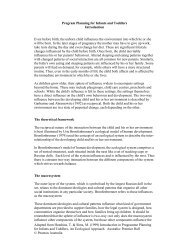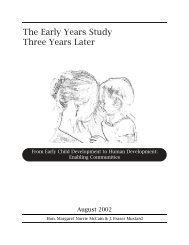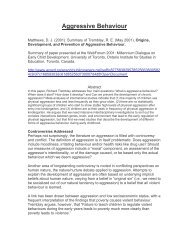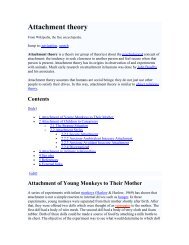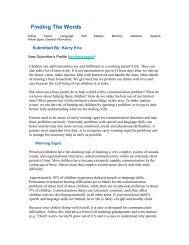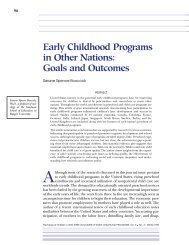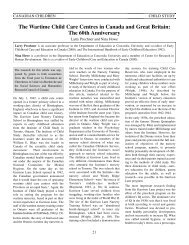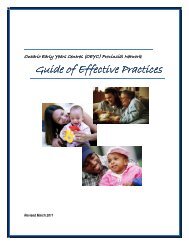Emotional Growth Through Musical Play - Peel Early Years
Emotional Growth Through Musical Play - Peel Early Years
Emotional Growth Through Musical Play - Peel Early Years
Create successful ePaper yourself
Turn your PDF publications into a flip-book with our unique Google optimized e-Paper software.
(Adult tickles baby under the arm.)<br />
<strong>Through</strong> the game, the physical human contact between adult and child creates a close feeling.<br />
The touch, physical closeness and facial expressions exchanged between the adult and child are similar<br />
to the interaction when singing a lullaby. As the rhyme progresses and the adult's fingers "walk" up the<br />
child's arm, the child starts to feels the anticipation of the tickle and grows more excited. When the<br />
climax of the tickle is experienced, an emotional high occurs. Repetition of this short game initially<br />
helps the child to become involved and also helps to create a mood. When the game is repeated as many<br />
times as the child would like, the emotional response grows stronger each time. When the child has had<br />
enough, the games reaches an end and the child relaxes, reaching a point of satisfaction.<br />
Bouncing rhymes have a greater appeal for older babies. Being jostled on an adults lap is stimulating to<br />
the inner ear and the sense of balance and develops the child's sense of physicality.<br />
One, two, three,<br />
(Baby is facing adult, sitting on the lap. Adult bounces baby to the beat of the rhyme.)<br />
Baby's on my knee,<br />
Rooster crows,<br />
And away she goes!<br />
(Adult gently "drops" baby backwards through the legs.)<br />
This is a much more active game but the emotional climax will develop in a similar fashion to the<br />
tickling game. The beginning of the rhyme moves to the line of anticipation "Rooster crows", and<br />
climaxes with the drop "And away she goes!" The baby will experience a deep feeling of joy with the<br />
repetition of the game.<br />
Babies and young children are reliant on their caregivers to give them these playful and joyous<br />
experiences. <strong>Emotional</strong> development is far too important to leave to chance. Parents and caregivers need<br />
to access the most artistic rhymes and games in the folk repertoire, use their own voices and their own<br />
touch to give babies deep emotional experiences.<br />
Mary Stouffer is a faculty member at the Royal Conservatory of Music in Toronto where she teaches Music With Your Baby<br />
classes, music for preschoolers and Kodály classes. She is also involved in teacher training and is a part-time instructor at<br />
Ryerson Polytechnic University. Mary is currently completing her M.Mus. in Education with Kodály Emphasis from the<br />
University of Calgary.<br />
This article was published by the<br />
Canadian Child Care Federation.<br />
Posted by the Canadian Child Care<br />
Federation.



